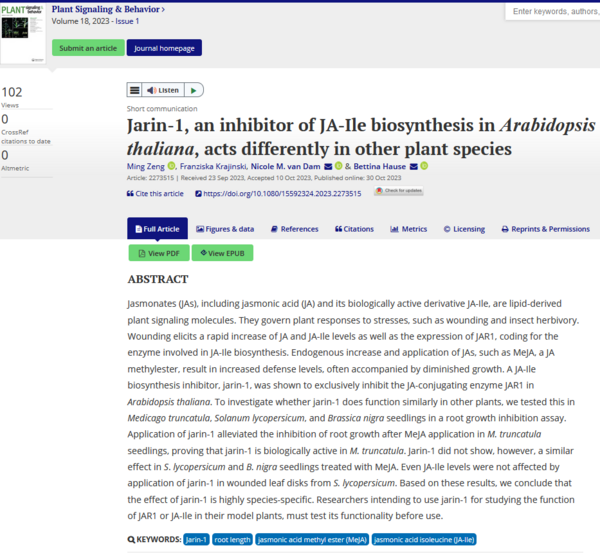Jasmonate inhibitor acts species-specific.
Not every inhibitor works in every plant. Bettina Hause and iDiv scientists recently discovered this for the substance Jarin-1. The effect of the alkaloid, a cytisine derivative, was originally discovered in Arabidopsis, where it inhibits the formation of the phytohormone JA-Ile. As the most important bioactive conjugate of jasmonic acid, JA-Ile is involved in numerous physiological processes, like inhibition of root growth and leaf senescence, but mainly in the defense against herbivores. As an inhibitor of the JA-Ile signaling, Jarin-1 is often used by plant researchers to switch off this signaling pathway for their respective research questions and to observe the consequences. This JA-Ile-inhibiting effect of Jarin-1 has been proven beyond doubt, at least for Arabidopsis, but does not appear to apply to all plant species without exception. This was shown by experiments carried out by various research groups who tested the inhibitor on strawberries and potatoes, for example, and did not achieve the desired inhibition of the JA signaling pathway.
The IPB and iDiv scientists have now tested the effect of Jarin-1 on three other plant species, namely barrel medick, tomatoes and black mustard. To do this, they used a root growth assay applying the inhibitor to seedlings of these plant species. As a result, only the barrel medick proved to be sensitive to the inhibitor, but not the mustard and tomato seedlings. The assumption of a species-specific effect of the JA-Ile inhibitor was thus further cemented. Scientists who want to use Jarin-1 to study the jasmonate signaling pathway should therefore first check its functionality in the respective investigated plant species, the iDiv scientists concluded in their short communication article.



